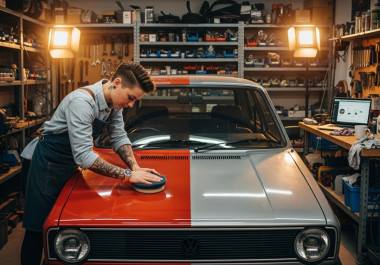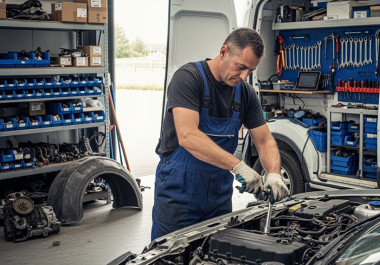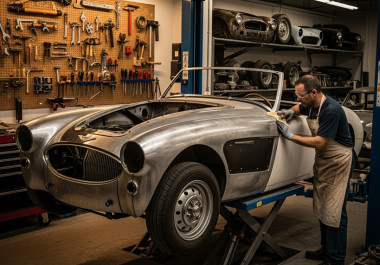The prospect of buying an ex-taxi or private hire vehicle (PHV) at auction can be exceptionally appealing, particularly for those seeking a vehicle at a significantly reduced price. These vehicles often present an opportunity to acquire a relatively modern car for a fraction of what a comparable privately owned model might cost. If you are hunting for a budget-friendly vehicle that has, in many cases, been subject to a regular maintenance schedule, then auctions featuring these former workhorses can indeed offer some of the most compelling deals available. However, it is crucial to approach such a purchase with a clear understanding of the typical lifecycle and condition of these vehicles. Ex-taxis and PHVs almost invariably come with high mileage and have endured considerable wear and tear due to the nature of their work. Therefore, a thorough appreciation of what you are getting into before placing a bid is absolutely essential. This guide will explore the advantages and disadvantages of buying an ex-taxi, detail what to look for in auction listings on platforms like Raw2K, and provide strategies to ensure you are making the best possible deal, ultimately helping you decide if this type of vehicle is the right choice for your needs.
What Are Ex-Taxi and Private Hire Vehicles?
Before diving into the pros and cons, it is important to understand the distinction between the main types of vehicles that fall under this umbrella, as their usage and regulation can differ, potentially impacting their condition and suitability.
The Difference Between Taxis and Private Hire Vehicles
-
Hackney Carriages (Traditional Taxis): These are the vehicles most people picture when they think of a taxi. They are licensed to be hailed directly on the street or to wait at designated taxi ranks. In many UK cities, the iconic "black cab" (though they now come in various colours) is a purpose-built vehicle designed for taxi work, known for its tight turning circle and passenger accessibility. However, in other areas, standard saloon cars or MPVs can also be licensed as Hackney Carriages. They are subject to stringent local council regulations regarding their condition, maintenance, and accessibility features.
-
Private Hire Vehicles (PHVs): Unlike Hackney Carriages, PHVs must be pre-booked through a licensed operator. This includes vehicles used by ride-hailing services like Uber or Bolt, as well as traditional local minicab companies. PHVs are typically standard saloon cars, estate cars, or Multi-Purpose Vehicles (MPVs). While they are also subject to licensing and safety checks, the specific requirements can sometimes be less rigorous than those for purpose-built Hackney Carriages, though this varies by licensing authority.
Where Do These Vehicles Come From?
Ex-taxis and private hire vehicles find their way to auction through several common routes:
-
Local Council Fleet Replacements: Many local authorities that license Hackney Carriages have age limits or specific condition requirements for vehicles operating as taxis. When vehicles reach this limit or no longer meet the criteria, they are often sold off, frequently through auctions.
-
Private Taxi and PHV Companies Upgrading Their Fleets: Larger taxi firms and PHV operators regularly update their fleets with newer models to maintain a modern image, improve fuel efficiency, reduce maintenance costs, or comply with changing emissions standards (like Clean Air Zones). Their outgoing vehicles are then typically sold through auctions.
-
End of Hire Purchase or Lease Agreements: Many taxi drivers or companies acquire their vehicles through hire purchase or lease agreements. Once the contract term expires, the vehicles are returned to the finance or lease company, which then often disposes of them via auction channels.
-
Independent Owner-Drivers Changing Vehicles: Individual taxi or PHV drivers may decide to upgrade their vehicle or leave the trade, choosing to sell their used vehicle through an auction for a quick and convenient sale.
For a current selection of available ex-taxi and private hire vehicles, it is always a good idea to check the listings on Raw2K’s vehicle auctions.
Why Buy an Ex-Taxi or PHV at Auction?
Purchasing a former taxi or PHV can offer a range of benefits, but these must be carefully weighed against the potential drawbacks.
The Benefits
-
Affordable Pricing: This is undoubtedly the primary attraction. Ex-taxis and PHVs generally sell for significantly less than equivalent privately owned cars of the same age and model. The high mileage and intensive use lead to faster depreciation, making taxi car auctions an excellent option for bargain hunters or those with a limited budget. The savings can be substantial, allowing buyers to access newer or larger vehicles than they might otherwise afford.
-
Regular and Rigorous Servicing: To comply with licensing regulations and to ensure reliability for constant daily use, taxis and PHVs typically undergo frequent and often thorough maintenance. Many operators will have strict servicing schedules, often exceeding manufacturer recommendations for private vehicles. This can mean that, despite high mileage, the core mechanical components like the engine and gearbox may have been well looked after, with regular oil changes and preventative maintenance.
-
Fuel-Efficient Diesel and Hybrid Options: Because fuel is a major operating cost, many taxis and PHVs are chosen for their fuel efficiency. This means you will find a high proportion of diesel models (known for good motorway mileage) and, increasingly, hybrid vehicles (like the Toyota Prius or Auris Hybrid), which are excellent for city driving and offer lower running costs. This focus on economy and, with hybrids, sustainability, is ideal for buyers seeking to minimise their own fuel expenditure.
-
Spacious and Practical Interiors: Many vehicles used as taxis or PHVs, such as MPVs (e.g., Ford Galaxy, Volkswagen Sharan) or larger saloons (e.g., Skoda Superb, Mercedes E-Class), are selected for their generous passenger and luggage space. This makes them inherently practical for families, individuals needing to carry bulky items, or even those considering using the vehicle for similar private hire purposes (subject to local licensing).
-
Proven Durability of Certain Models: Some car models have earned a reputation for being exceptionally durable and reliable in the demanding taxi trade. Vehicles like the Skoda Octavia, Toyota Avensis, and many Mercedes-Benz diesel saloons are known for their ability to cover huge mileages if properly maintained. Buying one of these known workhorses can offer some reassurance.
The Downsides
-
Extremely High Mileage: This is the most significant factor to consider. It is not uncommon for ex-taxis to have covered 200,000, 300,000, or even more miles. While regular servicing helps, such high mileage inevitably puts stress on all vehicle components, from the engine and transmission to suspension parts and interior fittings. This can affect their long-term durability and increase the likelihood of future repairs.
-
Significant Wear and Tear: Constant use, often 24/7 in the case of some company-owned taxis, leads to considerable wear and tear, especially on the interior. Expect to see worn seats (particularly the driver's seat), scuffed plastics, worn carpets, and potentially damaged door handles or window switches. The exterior may also show signs of a hard life, with more stone chips, minor dents, and scratches than a typical private car.
-
Potential for Past Accidents: Due to the sheer amount of time they spend on the road, often in busy urban environments, taxis and PHVs have a statistically higher chance of being involved in accidents, ranging from minor bumps to more serious collisions. While repairs should be carried out to a safe standard, the quality can vary, and undisclosed accident damage is a risk.
-
Higher Insurance Costs: Some insurance companies may increase premiums for former taxis or PHVs. This can be due to the perceived higher risk associated with their previous heavy use, high mileage, and the statistical likelihood of them having been driven by multiple drivers. It is essential to get insurance quotes before committing to a purchase.
-
Ex-Smoker Cars or Lingering Odours: Despite smoking bans in taxis, some older vehicles may have been smoked in or may have absorbed odours from carrying countless passengers and their luggage. This can be difficult to eradicate completely.
-
Specific Taxi-Related Modifications: Some purpose-built taxis or even converted saloons might have modifications (e.g., holes from meter or radio equipment, partition screens) that are undesirable for private use and may require removal or cosmetic repair.
If you are considering an ex-taxi, it is wise to check listings thoroughly. Raw2K’s vehicle auctions often feature a good selection, allowing you to compare different vehicles in both dedicated taxi car auctions and general private hire vehicle auctions.
How to Evaluate an Ex-Taxi or PHV at Auction
Careful evaluation is key to avoiding a problematic purchase. Pay close attention to the details provided in auction listings and conduct your own checks where possible.
Key Things to Look For in a Listing
-
Make and Model Reputation: Certain brands and models are renowned for their durability in the taxi industry. As mentioned, Toyota (especially hybrids like the Prius), Skoda (Octavia, Superb), Ford (Mondeo, Galaxy), Vauxhall (Insignia), and various Mercedes-Benz diesel models are popular choices for good reason – they tend to be reliable and relatively economical to run even with high mileage. Research specific models known for longevity.
-
Mileage – Context is Key: While high mileage is a given, it is not always an absolute deal-breaker if the price reflects it and there is evidence of excellent maintenance. A vehicle with 200,000 miles that has been impeccably serviced might be a better buy than one with 120,000 miles and a patchy history. However, generally, lower mileage options within the ex-taxi category are preferable if the price difference is not excessive.
-
Comprehensive Service History: This is arguably the most critical factor. Look for listings that mention a full or detailed service history. Ideally, this will be a stamped service book or a folder full of invoices detailing regular oil changes, cambelt replacements (if applicable), gearbox servicing, and other essential maintenance. A lack of service history on a high-mileage ex-taxi should be a major red flag.
-
MOT Status and History: Check the current MOT status and, importantly, the online MOT history (available via the GOV.UK website). A long, clean MOT pass history is a good sign. Look for recurring advisory items or failures on previous tests, as these can indicate persistent underlying issues or areas that might need attention soon. A vehicle with a fresh 12-month MOT provides some immediate peace of mind regarding roadworthiness.
-
Number of Previous Owners: While many ex-taxis will have been company-owned (one owner on the V5C), some might have passed through several hands. Fewer owners can sometimes, but not always, indicate more consistent care.
-
Visual Condition from Photos/Videos: Scrutinise the auction listing's photos and any accompanying videos. Look for obvious signs of exterior damage, mismatched paint, poor panel gaps (suggesting accident repair), and interior wear beyond what is reasonable for the age and mileage.
Checking the Vehicle History – Essential Due Diligence
Independent vehicle history checks are vital before bidding:
-
HPI Check (or similar): This will confirm if the vehicle has any outstanding finance (it legally belongs to the finance company until settled), if it has been reported stolen, or if it has been declared an insurance write-off (e.g., Category S – structurally damaged but repairable, or Category N – non-structurally damaged). Buying a vehicle with outstanding finance can lead to it being repossessed from you.
-
Look for Signs of "Clocked" Mileage: While less common with digital odometers, mileage tampering (rolling back the odometer to show a false lower reading) can still occur. Cross-reference the displayed mileage with MOT records, service history, and the general condition of the vehicle (e.g., excessive wear on the driver's seat, steering wheel, and pedals inconsistent with the claimed mileage).
-
Stolen Vehicle Reports: An HPI check will typically cover this, but it is a fundamental check to ensure you are not buying stolen property.
-
Verify Licensing History (If Possible): Sometimes, it is possible to find out which council licensed the vehicle. This might offer clues about its inspection regime, although this information is not always readily available.
For detailed listings of ex-taxi vehicles, including information that can help with your evaluation, check out Raw2K’s auction listings of all cars, which often categorise vehicles from taxi car auctions and private hire vehicle auctions.
Pricing and Bidding Strategies for Ex-Taxis and PHVs
Securing a good deal involves understanding the pricing nuances and bidding smartly.
Setting a Realistic Budget
Before you even start bidding, establish a firm budget that includes all potential costs, not just the hammer price:
-
Auction Fees and VAT: All auction houses, including Raw2K, charge a buyer's premium or indemnity fee, which is usually a percentage of the hammer price or a fixed sum. VAT may also be applicable, particularly if the seller is a VAT-registered business. These can add a significant amount to your final outlay, so factor them in precisely. Our terms and conditions page details our fee structure.
-
Potential Immediate Repair Costs: Be prepared for the possibility that an ex-taxi will need some immediate attention. This could range from new tyres or brakes to more significant servicing or cosmetic fixes. Having a contingency fund is wise.
-
Reconditioning and Cleaning Costs: The interior will likely need a deep clean or valet. You might also want to budget for minor cosmetic repairs to improve its appearance.
-
Insurance and Registration Expenses: As mentioned, insurance can be higher. Also, account for road tax (VED) and the cost of transferring ownership.
-
First Service Under Your Ownership: Even with a good history, it is good practice to give any newly purchased used car, especially an ex-taxi, a service soon after purchase, so you know its current state.
Understanding Reserve Prices vs. No-Reserve Auctions
-
Reserve Auctions: In a reserve auction, the seller sets a minimum price they are willing to accept. If bidding does not reach this (often undisclosed) reserve, the vehicle will not sell. This offers some protection to the seller against an unusually low price, but means you might not win the vehicle even if you are the highest bidder if the reserve is not met.
-
No-Reserve Auctions: Here, the vehicle sells to the highest bidder, regardless of the final price. This can lead to genuine bargains if there is limited interest, but it can also mean vehicles in poorer condition might still sell if someone is willing to take a chance.
Many auctions on Raw2K will clearly state whether a reserve is in place. You can often find auctions running today or check schedules for specific days like Monday or Thursday.
Effective Bidding Tips for Ex-Taxis
-
Observe Similar Lots: Before bidding, watch a few auctions for similar ex-taxis to get a feel for price levels and bidding activity.
-
Avoid Emotional Bidding: Set your absolute maximum price (including all fees and potential repair costs) and stick to it rigidly. It is easy to get caught up in the moment.
-
Consider Less Competitive Lots: If multiple similar ex-taxis are available, you might find less competition (and therefore a better price) on a lot that is perhaps listed later in the auction or is a slightly less popular colour or specification.
-
Factor in Condition Heavily: Two seemingly identical ex-taxis can have very different underlying conditions. Prioritise vehicles with better service history and apparent condition, even if they are slightly more expensive initially.
-
Utilise Proxy Bidding: Many online auction platforms, including Raw2K, offer a proxy bidding system. You enter your maximum bid, and the system will automatically bid on your behalf up to that amount, only placing bids when necessary to keep you in the lead. This helps prevent overbidding in the heat of the moment.
What to Do After Winning an Ex-Taxi at Auction
Congratulations on your successful bid! Here are the next steps:
Finalising the Purchase
-
Prompt Payment: Complete the payment for the vehicle, including all fees, within the auction house's required timeframe. This is usually quite short, often 24-48 hours.
-
Obtain All Documentation: Ensure you receive the V5C logbook (essential for registering the car in your name), any available service history, MOT certificates, and spare keys.
-
Keep a Copy of the Invoice: The auction invoice is your proof of purchase and will be needed for legal and insurance purposes.
Transporting Your Vehicle
-
Drive it Home (If Roadworthy): If the car has a current MOT, is taxed (or you tax it immediately online), and you have arranged insurance, you may be able to drive it home.
-
Arrange Professional Transport: If the vehicle is not roadworthy (e.g., no MOT, known fault), or if it is located a long distance away, arrange for it to be transported by a vehicle recovery service or a specialist car transport company. Information about vehicle locations and collection can be found on the Raw2K platform.
Getting Insurance and Road Tax
-
Insurance: This is a legal requirement before driving on public roads. As mentioned, some insurers specialise in policies for ex-taxis, so it is worth shopping around for quotes. Be upfront about the vehicle's previous use.
-
Road Tax (VED) and MOT: Ensure the vehicle is taxed in your name and has an up-to-date MOT certificate before using it regularly.
If you need assistance with the registration process or have questions about changing the vehicle class if it was previously registered as a licensed taxi, you might find helpful information on Raw2K’s help pages, or you can contact us for guidance.
Is an Ex-Taxi or PHV Right for You?
Considering your specific needs and circumstances is crucial.
Best Buyers for Ex-Taxis and PHVs
-
Ride-Share Drivers (e.g., Uber, Bolt): For those looking to enter the ride-sharing industry or replace an existing PHV, an ex-taxi can be an affordable and often suitably equipped vehicle, ready for licensing (subject to local PCO/PHV regulations). Many will already have features desirable for this work.
-
Budget-Conscious Private Buyers: If your priority is a cheap, spacious, and generally well-maintained car for everyday use, and you are not overly concerned about high mileage or minor cosmetic imperfections, an ex-taxi can offer incredible value. It can provide reliable transport for years if chosen carefully.
-
Businesses Needing Utility Vehicles: Small businesses might find an ex-taxi MPV or estate a cost-effective solution for staff transport, local deliveries, or as a general-purpose utility vehicle.
-
DIY Mechanics or Enthusiasts: For those comfortable with carrying out their own maintenance and minor repairs, an ex-taxi can be a particularly good buy, as they can address issues more cheaply than paying garage labour rates.
Who Should Probably Avoid Buying One?
-
If You Prioritise Low Mileage and Pristine Condition: If your ideal used car has minimal mileage, an immaculate interior, and flawless paintwork, an ex-taxi is almost certainly not the right choice. These are working vehicles, and their condition reflects that.
-
If Resale Value is a Major Concern: Ex-taxis and PHVs tend to depreciate more rapidly and have a lower ultimate resale value than equivalent privately owned cars due to their high mileage and previous use. If you plan to sell the car on after a short period and want a good return, be cautious.
-
If You Are Unwilling to Invest in Minor Repairs or Reconditioning: Many ex-taxis will benefit from, or even require, some level of cleaning, minor repairs (e.g., replacing worn interior trim), or cosmetic fixes to bring them up to a standard you are happy with. If you want a "turn-key" perfect car, this might not be for you.
-
If You Need a Car for Prestigious Use: While some ex-taxis are from premium brands, their history and potential condition might not align with needs where vehicle image is paramount (e.g., certain professional uses).
Final Thoughts
Buying an ex-taxi or private hire vehicle at auction can undoubtedly be an excellent way to secure a functional and often well-maintained vehicle at a very attractive price. They can offer great value for money, benefit from a history of regular servicing, and provide a variety of fuel-efficient and spacious models. However, success in this market hinges on knowing exactly what to look for, being diligent in checking vehicle history and condition, and being realistic about the inherent characteristics of these high-usage vehicles, particularly wear and tear. By approaching taxi car auctions and private hire vehicle auctions with a clear strategy and a cautious eye, you can significantly increase your chances of driving away a bargain that serves you well.
If you are looking for ex-taxi or private hire vehicles at auction, start your search at Raw2K’s vehicle auctions today. You can often find a wide variety of options suitable for different needs and budgets.




